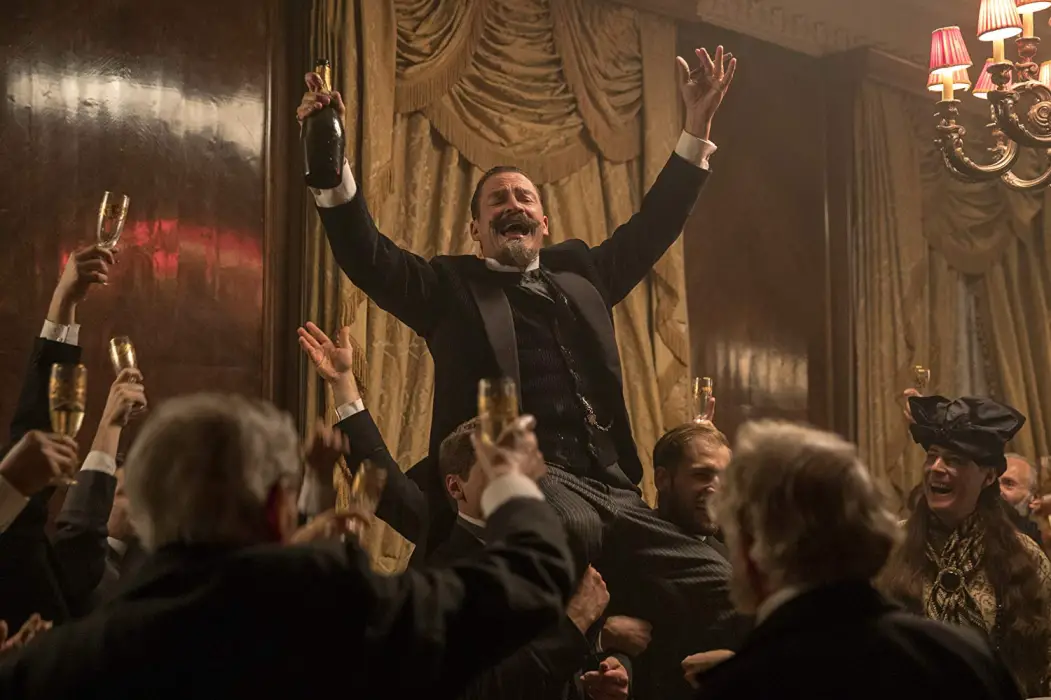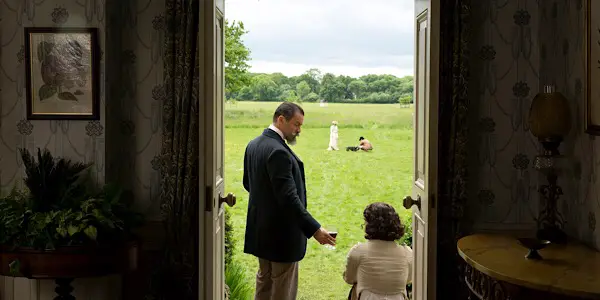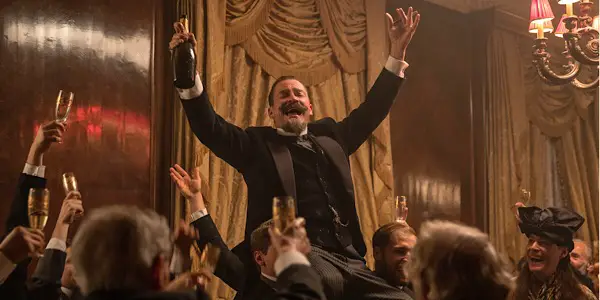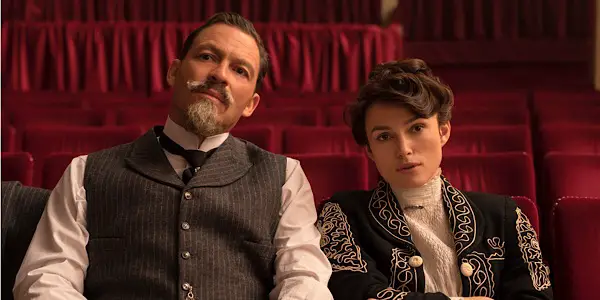“We are still having these arguments we had hundreds of years ago,” Interview With Dominic West, Star Of COLETTE

Kristy Strouse is the Owner/Editor in Chief of Film Inquiry,…
You might know Dominic West for his roles in The Wire or The Affair, or any one of his many incredible film roles including last year’s The Square. He’s been in the industry for a long time and has had several amazing cinematic ventures. In Colette, we are able to see him give another great performance as Willy, writer and husband of Colette.
I was able to speak with West about his take on the real life Willy, what appealed to him about the film, and what’s coming next for him!
Kristy Strouse for Film Inquiry: Terrific job in the film! Thanks for taking the time today. What appealed to you about the film?
Dominic West: I think it’s always the script. I loved the dynamic that the two characters had, Willy and Colette, and I also always wanted to work with Keira. I love that period, I think the Belle Époque is so exciting in Paris. It’s an incredibly exciting, glamorous time. When where so many were in flux, and so many great artists were just starting out. So, it was really those three things.
But I suppose in terms of the character of Willy, I was interested because he’s obviously the villain of the piece, but I think you have to see, and I think the script brings it out, why she loved him, and I think she really did love him, and he loved her. For a short while at least they were this incredible, glamorous celebrity couple at the center of Belle Époque Paris and so I wanted to try and see what it was about him that she loved. I think it was really his energy and his appetite for his ideas and the fact he was great company and fun to be with.

I think the two do seem like they are in love in the beginning. They have such a great rapport, and seem to accept and understand one another at first, and then that changes. And then things get bigger with Claudine, Willy does some despicable things.
Dominic West: You have to see why she stuck with him, she wasn’t a victim, she was overshadowed by him and she was exploited by him, but she wasn’t a victim. She knew what she was doing, and I think he was her meal ticket into the great metropolis and to the literary world and when he was no longer useful to her she got the hell out. I think she was in control is what I mean, she was such a strong woman that I don’t think she was ever fully dominated by him.
I get that, and I think he even brought out the artist/writer in her even more which was huge for her because she went on to do a lot of work after they split.
Dominic West: Yeah, I mean he was the most famous writer in France at the time and even after his death, 15 years after the film, 3000 people showed up. He was a big star. I suppose if editors had existed then in the modern sense, then he would’ve been an editor. He probably would have been a very good editor and wouldn’t have worried so much about being a bad writer and having to pretend that the real talent was his. I think he did have real talent, and it was as an impresario and as a marketing brand maker and as an editor. He had a whole stable of writers that would churn out these best sellers, kind of like James Patterson or someone does today and that was his talent and, in many ways, he was ahead of his time.
Did you do any research on the real-life Willy, and had you heard of him previous to the role?
Dominic West: No, no I had never heard of him, no one had ever heard of him [laughs]. You know, this massive star, no one’s ever heard of him. Ironically the only reason anyone has ever heard of him is because he was married to Colette and was the villain really in her story. All the biographies of Colette, the main one being “Secrets of the Flesh” by Judith Thurman, that is what Richard had read and got him excited about the story in the first place. That biography and all the other ones talk about Willy extensively so that was really what I did. I read those, and I read some of Willy’s writing but not much, it’s not really worth reading. I read quite a bit of Colette’s, mainly those biographies and Colette’s work.

As you said Willy is considered the villain because of the circumstances between him and Colette but he’s also a charmer, and people wanted to be around him.
Dominic West: There’s a sort of Orson Welles dimension to him. He’s a shit and a manipulating misogynist, but there is a Welles-ian largess, a generosity to him and I kind of like the fact that although he effectively stole the proceeds, he wasn’t hoarding it. He was spending it on her and his friends and he was the guy who picked up the tab and he was a gambler, he lived life large. He had a huge appetite for food and wine, and women and life in general, I think. That aspect, I think, is the most likable part of him.
Yeah I was actually surprised, I didn’t know much about Willy or Colette. I didn’t know much going into it the film, but I was surprised how big of a brand Claudine was.
Dominic West: It was amazing! It must have been one of the first modern successful brands, because it was all over France. As you see in the film, everyone was cutting their hair and dressing like her and Willy was flogging soap, cologne and candles, anything he could, sort of like Star Wars merchandise is now. He understood marketing, merchandise and celebrity in a very modern way and I think also in a very modern way that he was happy to cannibalize his own life to gain notoriety and of course Colette’s life. He was very conscious of any publicity is good publicity and any scandal is gonna generate revenue and in that way, there are so many parallels of today.
Definitely! You and Keira Knightley had a great chemistry, a terrific fast paced banter between you two, which I loved, what was it like working with her?
Dominic West: It was great, it was pretty easy to get that rapport going. I had never met her before but I have admired her for a long time. We got a couple weeks of rehearsal beforehand and that was great, we started off polka for our wedding and for some reason it didn’t make the final film. I think it had more to do with me obviously than Keira who you see dancing very well in the film. So, yeah we did hit it off and she is obviously easy to love, and very open. We had good fun and I really like her and she’s a good fighter, a good sparring partner and I love that.
The timing is especially relevant for the story. It’s interesting because this took place a long time ago, but women still deal with these challenges now. Hopefully we’ve come a long way since then.
Dominic West: That’s what is interesting, we haven’t really, we are still having these arguments we had hundreds of years ago. This is what is so surprisingly contemporary about the story, she left her domineering husband for another woman who identified as a man and wore men’s clothes at a time when you could be jailed for wearing them and you still can in certain parts of the world. Obviously, the world has changed so much since then but in these small social norms we haven’t changed much at all and these debates are still going on.
We had a lot of transgender actors in the film, I think more than probably any other film around at the moment, and it was interesting talking to them and every one of them had a story of persecution in a way. Of growing up and having a tough time with people mocking and bullying them, sometimes very physically, so we haven’t really got very far since then and this is in America, the UK and Europe, never mind Russia or anywhere else in the world.
These are social debates and norms we are still battling to give people their freedom and their autonomy, to let them be who they want to be, and that’s very much a big message in the film and the reason Wash wanted to make it.
Yeah, I was being optimistic when I said that, but I think women’s voices, and being able to speak out more, in that regard – at least – we’re progressing.
Dominic West: There is a reason this film has been seventeen years in the making and the reason it’s being made now, it came out before the #Metoo movement got going but there is a realization now that we want to hear women’s stories and we want to hear the stories of great women like Colette and it wasn’t possible to make fifteen years ago, I mean it was, but it wasn’t made fifteen years ago. It is being made now and, in that way, it’s a good thing and it’s certainly good for men as well as women, for male actors like me.

Definitely. To switch gears a bit, you’ve done a lot of television work as well as film, is there a preference or is it dependent on the project?
Dominic West: I prefer film in that I prefer a finite end to things. The trouble with the TV shows I’ve done, which have been great, I’ve been lucky to work with great writers and other actors but I’m not so keen on the open-ended nature of it. It’s easier to focus on a part when you have an end date in sight, with TV I’ve found it sort of just goes on and on and eventually the writers start writing your life into it and that starts getting a bit weird. [laughs]
[Laughs] Understood. What do you have coming up next? I know you have Les Miserables which you are also producing, could you tell us what’s coming up for you?
Dominic West: Yeah that’s a BBC/PBS joint project and it’s a six-part serialization of Les Miserables, not the musical version and I’m very excited about it because it’s the most amazing story. My family are all mad about the musical, but the book is obviously even better. It’s an amazing book and in a one-and-a-half-hour musical you don’t get a lot of the intricacies of the book, and so hopefully we can show a bit more of that in a six-hour serial which hasn’t really been done, certainly for a very long time.
It’s probably the best book I’ve ever read and it is one of the greatest books ever written and it very much merits a six-hour examination, so I had a great time doing that with Jean Valjean. It was nice for me to play a proper hero for once instead of a philandering cad which seems to be what I am doing most of the time [Laughs] so I loved doing that, and that’s in January I think. I’m doing a little comedy in the UK, an independent film next week and then I have to do The Affair for another season and then in the Spring Ruben Östlund is making another film, he made The Square, I don’t know if you’ve seen it, and hopefully I will be involved in that.
Yes! I loved The Square. Those all sound exciting, and it seems like you are quite busy!
Dominic West: Yes, well actually, I’m trying not to be. I’m trying to stay at home. I’ve got loads of kids! I’m trying to get a sabbatical, well, we are going away on an RV trip for several months and the moment you plan something like that then you have all these jobs come in.
We want to thank Dominic West for taking the time to speak with us.
Colette was released in the US on September 21st and will be released in the UK on January 25th. Find more information about the film here.
Does content like this matter to you?
Become a Member and support film journalism. Unlock access to all of Film Inquiry`s great articles. Join a community of like-minded readers who are passionate about cinema - get access to our private members Network, give back to independent filmmakers, and more.
Kristy Strouse is the Owner/Editor in Chief of Film Inquiry, writer, podcaster, and all around film and TV fanatic. She's also VP of Genomic Operations at Katch Data and is a member of The Online Association of Female Film Critics and The Hollywood Creative Alliance. She also has a horror website: Wonderfully Weird & Horrifying.













